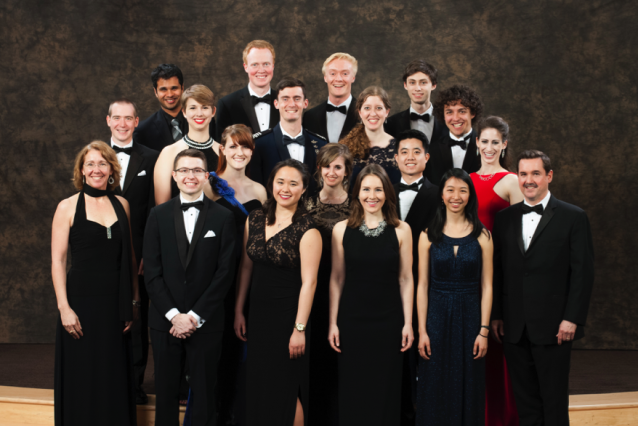MIT, News | March 16, 2017
Two from MIT recognized as outstanding engineering leaders

Grad students Kristen Railey and Alexander Feldstein were named to the Aviation Week Network’s “20 Twenties” for 2017.
By Meg Cichon | Lincoln Laboratory
Alexander Feldstein ’15, an MIT graduate student in aerospace engineering, and Kristen Railey ’13, an MIT graduate student in mechanical engineering and former technical staff member in MIT Lincoln Laboratory’s Advanced Undersea Systems and Technology Group, were selected as two of the Aviation Week Network’s “20 Twenties” for 2017.
The “Tomorrow’s Engineering Leaders: The 20 Twenties” awards program recognizes the top science, technology, engineering, and math undergraduate and graduate students for their academic excellence, research and projects they undertake, and their contributions to the broader community. The 2017 winners were honored during Aviation Week’s 60th Annual Laureates Awards on March 2 at the National Building Museum in Washington.
“One of the pillars of our service to the aerospace community is actively engaging and developing next-generation technology talent who are essential to the future of this exceptional industry,” said Greg Hamilton, Aviation Week Network president. “Truly, this year’s nominees and winners represent the best in terms of their talent, their creativity, and their ability.”
In collaboration with the American Institute of Aeronautics and Astronautics (AIAA), the Aviation Week Network reviewed nominations from 37 universities. This year’s nomination pool was particularly competitive, with more than 70 of the top scores differing by just hundredths of a point.
Railey first worked with Lincoln Laboratory in 2012 as an undergraduate in the MIT Engineering Systems Design and Engineering Systems Development courses, which are capstone courses sponsored by Beaver Works. As part of a 25-member team, Railey worked to create a novel power supply system for unmanned underwater vehicles that produces hydrogen from a reaction between aluminum and seawater.
In 2014, Railey joined Lincoln Laboratory as assistant staff in the Rapid Prototyping Group and then moved to the Advanced Capabilities and Systems Group. In 2015, she joined the then newly developed Advanced Undersea Systems and Technology Group, where she programmed, designed, and analyzed robotic underwater military defense systems and their components. During her time at the laboratory, Railey was heavily involved in outreach programs. She founded the Girls Who Build workshop series, which encourages young women to pursue science, engineering, technology, and math (STEM) fields. For example, the Girls Who Build Cameras workshop teaches girls how to build a Raspberry Pi camera and how to program Instagram-like image filters. Railey also published online curricula for the Make Your Own Wearables and Girls Who Build Cameras workshops for students and educators to freely download. MIT also offers the workshops among its online coursework.
“Kristen has been an impressive force in the impact she had made on students in STEM initiatives. Her efforts in inspiring young girls to get interested in engineering through creative workshops has been very effective.” said David Granchelli, manager of the Communications and Community Outreach Office at Lincoln Laboratory. “Kristen reminds girls at the workshops that they can do anything and pursue any career that they want by believing in themselves and working hard.”
In 2016, Railey became a PhD candidate in the MIT/Woods Hole Oceanographic Institute joint program, which is considered one of the world’s most prestigious graduate degree programs in marine science. During the two-year Oceanographic Engineering program, Railey will focus her research on signal processing and autonomy in underwater robotics. She is also a joint Draper and National Defense Science and Engineering Fellow. Railey holds a bachelor’s degree in mechanical engineering from MIT.
Alexander Feldstein is a graduate student pursuing a master’s degree in the MIT Department of Aeronautics and Astronautics (AeroAstro). His research focuses on multi-fidelity, uncertainty quantification, and design under uncertainty techniques for complex system design. He has held internships working on aircraft design at the Cessna Aircraft Company (now Textron Aviation) and The Boeing Company.
During his undergraduate studies, he worked as a student researcher at the Aerospace Computational Design Laboratory, aiding in the design of an optimization algorithm chooser. He was also a researcher at MIT’s Gas Turbine Laboratory, where he assisted with wind tunnel testing of the D8 model aircraft.
During his senior year of undergraduate work, he was the co-winner of the MIT Department Mechanical Engineering de Florez Award for a project on the use of zero-net mass-flux jets for wing flutter control. Feldstein was also recognized with the AeroAstro Teaching Assistantship Award. He holds a bachelor’s degree in aeronautics and astronautics from MIT.
The Aviation Week Network is the largest multimedia information and services provider for the global aviation, aerospace, and defense industries. The “20 Twenties” awards were established in 2009 in partnership with Raytheon Company.




